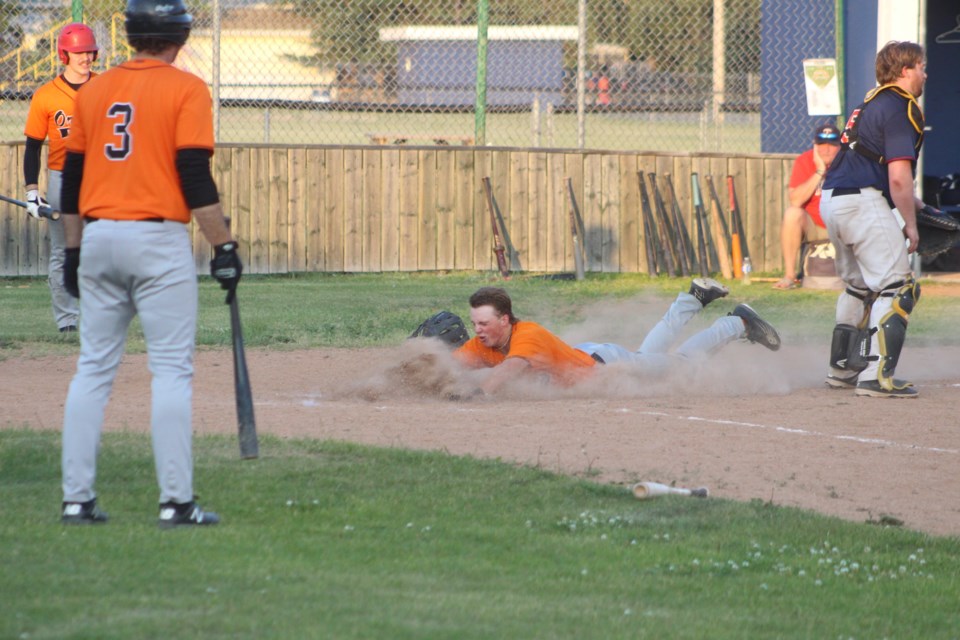BARRHEAD - It has been a tough few years for the North Central Alberta Baseball League (NCABL).
However, long-time commissioner Paul Riopel and the league governors want to restore the league to its former glory.
Founded in 1968, the Senior 'AA' NCABL kicks off its 58th consecutive season with six teams on May 6, with the defending champions, the Westlock Red Lions, facing the Legal Primeaus at home at Keller Field. The following evening, the Barrhead Orioles host the St. Albert Cardinals at home. The other two teams are the Parkland Twins, which won last year's pennant and play out of Spruce Grove, and the Edmonton Angels. The latter is a new team which replace the Edmonton Reds who opted not to return this season.
Riopel has been with the league since its inception and has experienced ebbs and flows.
"We are in a rebuilding phase," Riopel said. "Last year, I saw small improvements in most teams over the year before, and I believe we will continue to see that."
A good example of a team that has made small, continuous improvements is the Barrhead Orioles, which returned to the league after a five-year hiatus.
"At times, they showed marked improvement, but they were inconsistent," Riopel said.
He suggested that Barrhead needs to take the next step is a deeper bench, noting the Orioles lost a step when they lost one of their leaders, Chase Visser, late in the season due to injury, and his loss was especially evident in the playoffs.
To guard against such things happening, Riopel said the Orioles and other NCABL franchises, present and future, would put them in good stead if they patterned themselves after Westlock.
He said that although the Red Lions are managed by committee, they have always had one motivated individual who steers the franchise for a prolonged period before passing the torch to the next.
Impact of the pandemic on the league
In 2019, the NCABL had 10 teams with good representation from rural communities and the Edmonton region. Then the pandemic hit.
"COVID was tough on many sports leagues, and we are no different," Riopel said, adding that the NCABL faired better than most amateur sports leagues, noting that they were the only Alberta sports league that played a regular season in 2020.
Unfortunately, while the NCABL proved nimble enough to continue playing throughout the pandemic, they did not come out unscathed.
In the first year of the pandemic, the league lost three teams, dropping to seven. In 2021, they lost another and yet one more in 2022.
The loss of teams also directly impacted the quality of the product on the field.
"The quality of ball [NCABL fans saw] in 2022, 2023 and 2024 was nowhere close to the ball we played the decade before the pandemic," Riopel said, adding the good news is that he already sees the trend reversing, but added it would take time until they got back to pre-pandemic levels.
Improving the level of play and fast-tracking growth
To make that big jump in the quality of play at the league level, he said the NCABL needed to add more teams. If it wanted to make a substantial league-wide jump in skill level and subsequent play, more teams are required.
"My challenge as commissioner is adding at least two more teams in the next few years. When you do that, two things happen: you get a larger pool of players, increasing the number of quality players," Riopel said.
He added that fans would notice the improved quality of rosters even more come the postseason.
"If you have eight franchises and [four don't make the playoffs], the teams left are assured to be pretty darn good."
As to where the new teams will come from, Riopel said in previous years, they often came from the greater Edmonton region, which could be the case again.
But his preference is that they would come from smaller communities, suggesting Bon Accord, Gibbons, and Athabasca all have the necessary facilities and have had past franchises.
"The NCABL was born in the rural area of North Central Alberta, where it thrived for the first 25 to 30 years, and as commissioner, my emphasis has been on reviving baseball, more so in rural communities over urban Alberta," Riopel said.
Barry Kerton, TownandCountryToday.com



